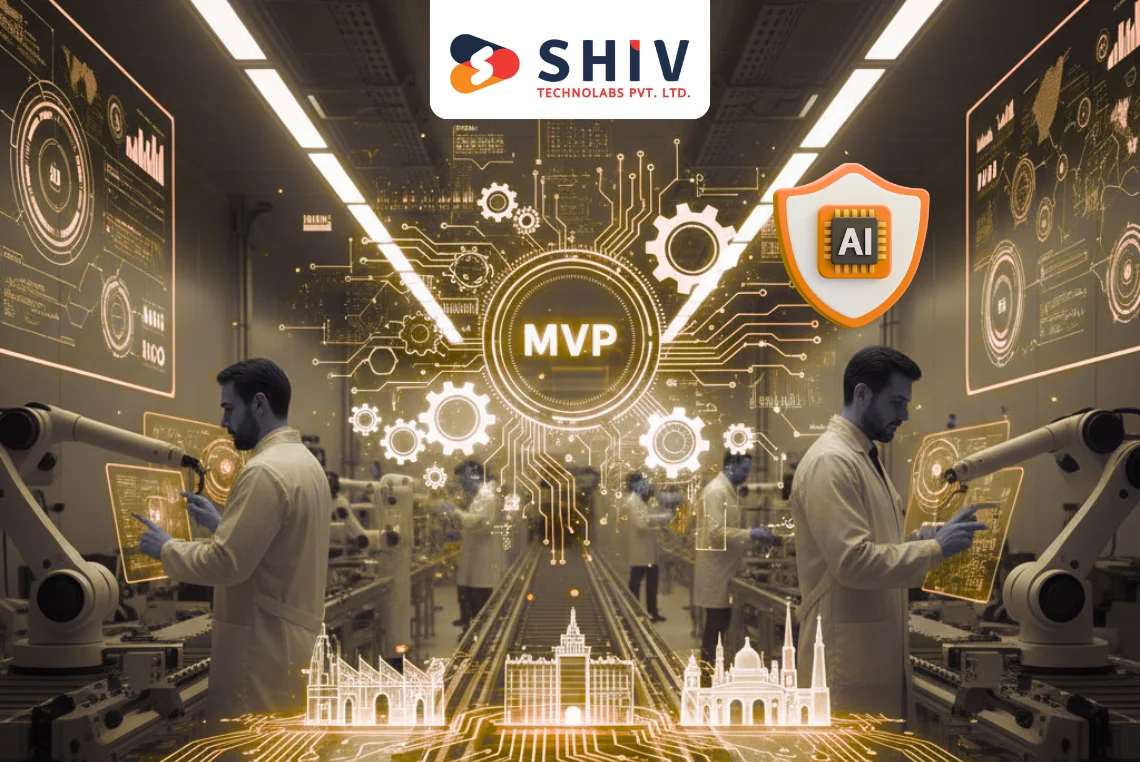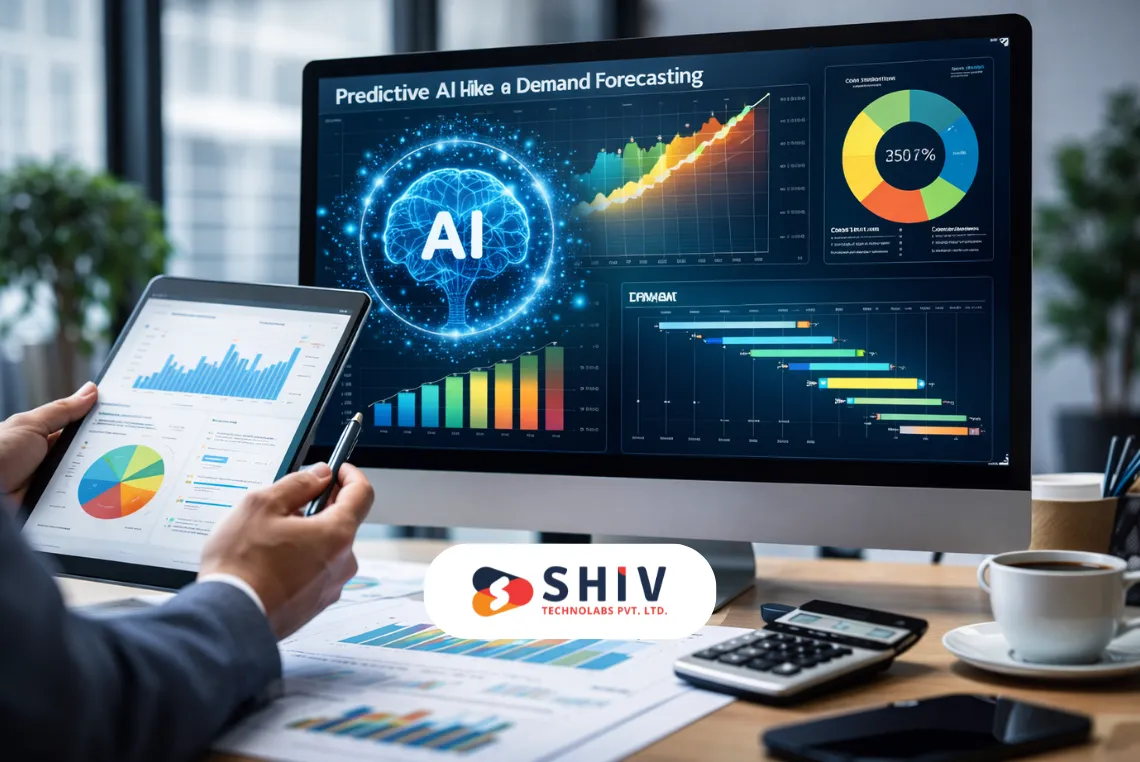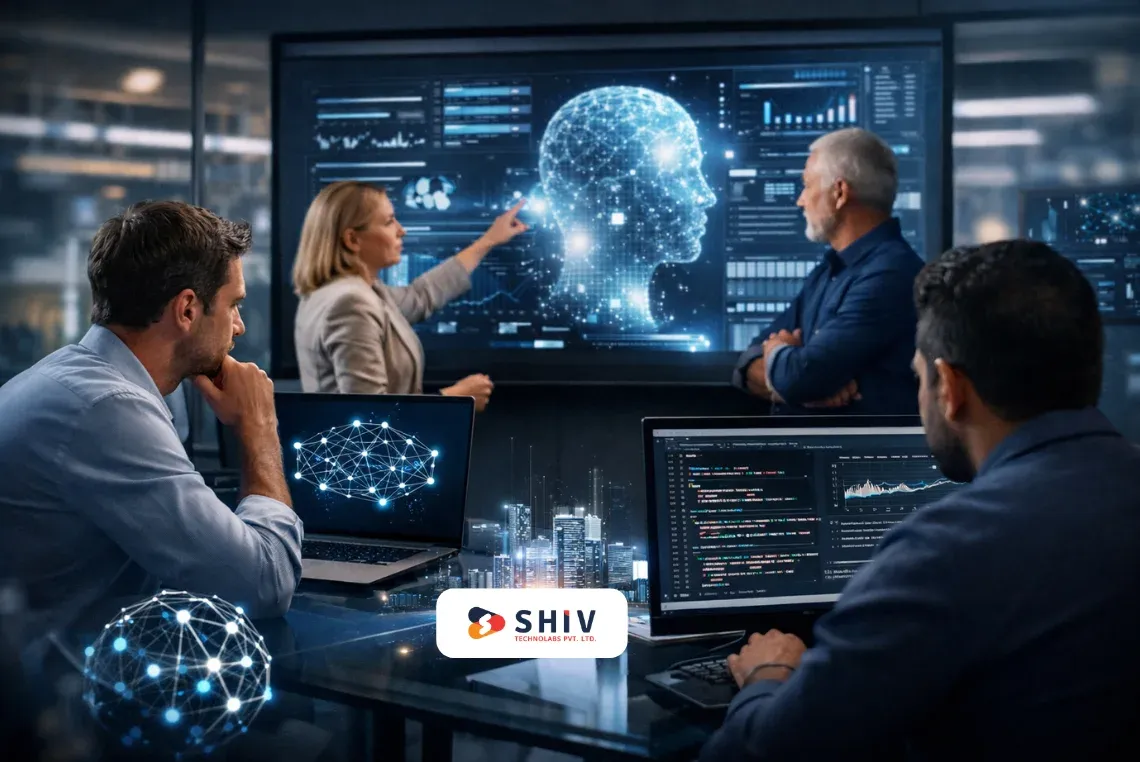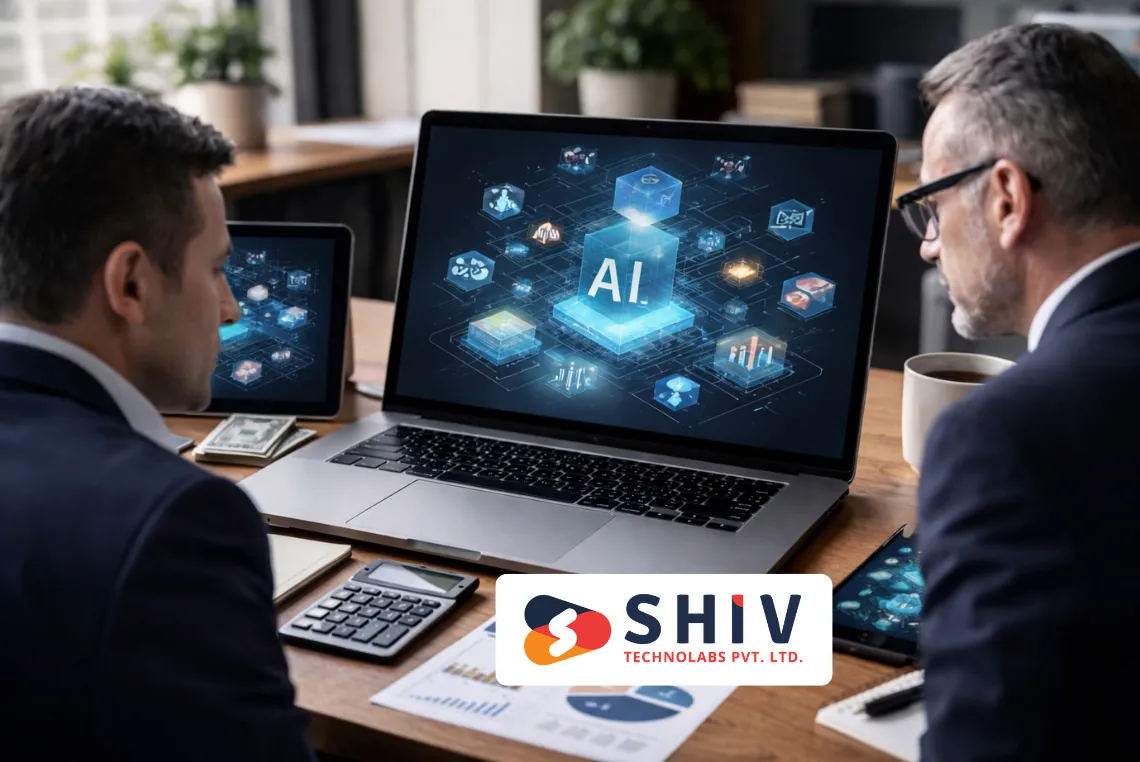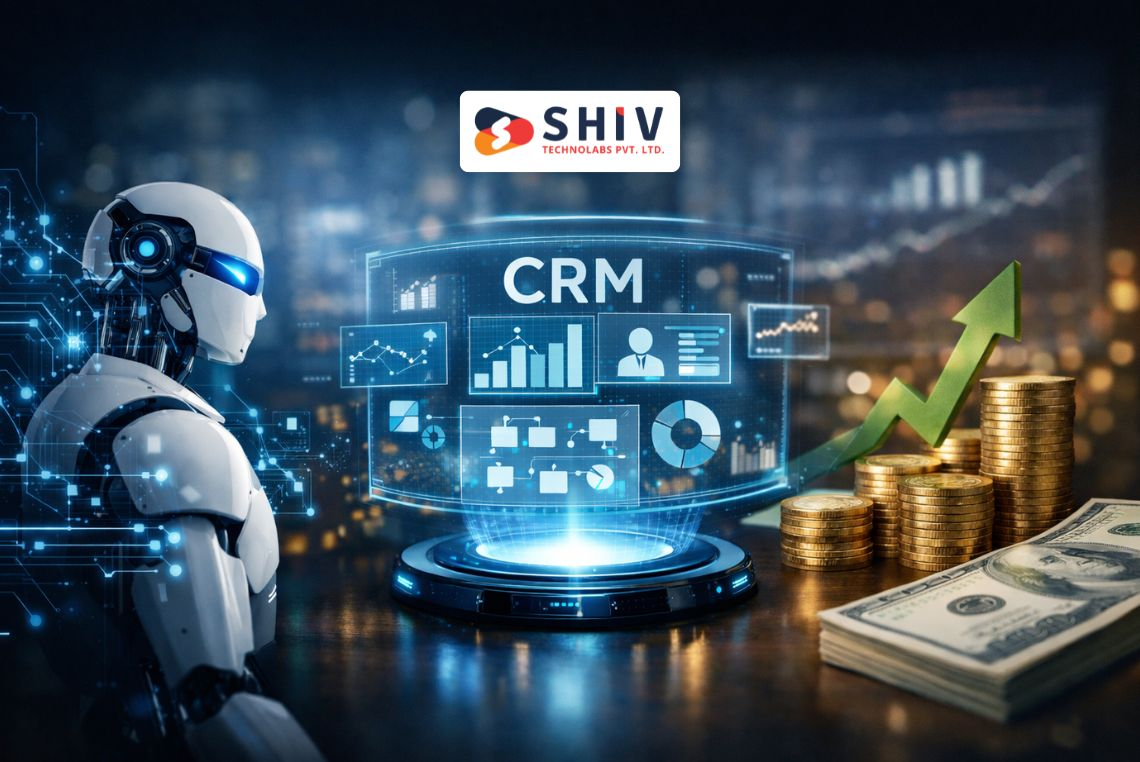Table of Contents
Germany’s smart manufacturing sector is growing fast as factories add robotics, vision systems, and AI in manufacturing. AI-powered MVP software acts as the bridge from early ideas to tested features that meet production needs. Many founders choose MVP development services in Germany to cut risk, move faster, and control development costs.
With clear milestones and rapid sprints, teams model real production scenarios and spot practical wins early. Teams ship only what matters, then extend features based on data from machines, lines, and shop floors. This approach keeps budgets tight while building confidence for investors, partners, and first manufacturing clients.
AI software for manufacturing startups brings predictive planning, defect detection, and adaptive workflows into the very first release. You get a testable core that speaks to operators, integrates with machines, and grows with real factory data. From there, you can pitch buyers with proof, close pilots faster, and scale with measured confidence.
Our team builds AI-powered MVP software with clear roadmaps, factory-ready integrations, and measurable gains from day one. We guide founders through regulatory steps, vendor choices, and pilot design so projects move forward with confidence.
Why Are Smart Manufacturing Startups in Germany Turning to AI-Powered MVP Software?
Industry 4.0 goals, skilled engineers, and Mittelstand demand push startups toward AI product development in Germany. They need early proof for factory buyers, predictable budgets, and short cycles that align with production schedules. AI-powered MVP software answers that pressure by building testable features that track real machine and line behavior.
Startups using this route gather data early, win stakeholder trust, and pitch measurable outcomes during procurement reviews. They learn faster than rivals, cut rework, and convert pilots into longer contracts with clear technical roadmaps. The result is a repeatable path from sketch to shop floor with fewer surprises and steady cost control.
AI also supports automation across quoting, scheduling, and maintenance, which strengthens unit economics from day one. With better forecasts and fewer line stops, teams release features that match buyer goals and factory realities. That combination delivers a clear edge in tenders where speed, accuracy, and reliability drive selection decisions.
Main reasons:
- Faster prototyping and reduced production delays
- Lower risk through AI-based testing
- Data-driven process improvement
- Easier transition from prototype to scale
These factors explain why AI MVPs have become the default path for many German manufacturing founders. They align capital discipline with fast learning, which is vital in equipment-heavy industrial markets.
How Does AI Help Build MVP Software for Manufacturing in Germany?
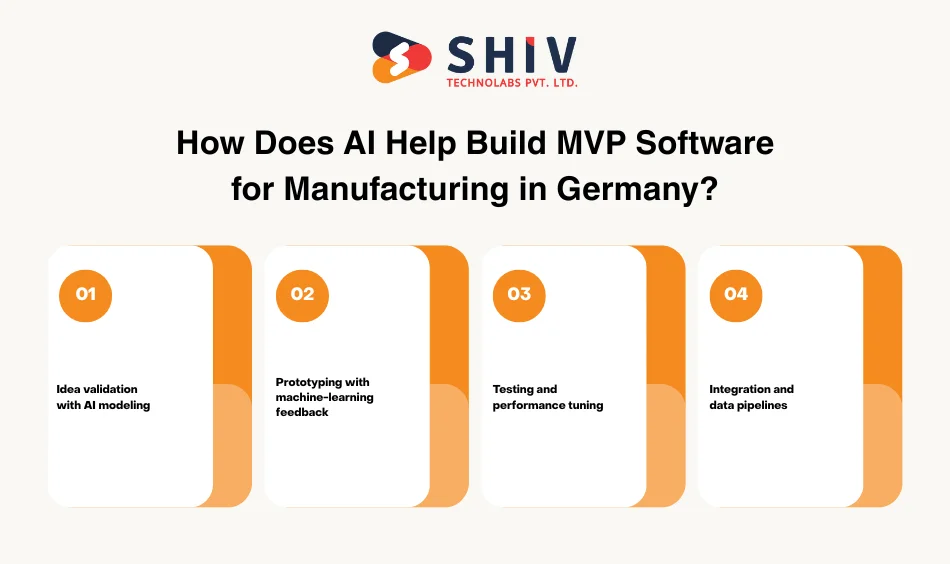
Quick answer: AI speeds validation, builds factory-ready features, and cuts rework with data-driven feedback loops. It turns plant signals into a testable core that fits German production goals.
Founders ask how AI helps build MVP software for manufacturing in Germany without burning budget or time. The path uses focused phases where AI MVP software converts sensor, line, and ERP data into practical features. Each step reduces guesswork and brings AI in manufacturing closer to daily operations.
Idea validation with AI modeling
Teams run small data trials and digital twins to pressure-test assumptions before coding. Early simulations reveal bottlenecks in throughput, changeovers, and quality drift. You get a shortlist of features buyers value during pilot talks. See related factory context in IoT in manufacturing.
Prototyping with machine-learning feedback
Engineers ship a thin slice connected to machines, sensors, or an MES sandbox. Models learn from live or historical signals and report cycle time and yield impact. The roadmap reflects real plant behavior, not slideware.
Testing and performance tuning
QA compares results against baseline scrap, downtime, and OEE trends in controlled trials. Models retrain with seasonal shifts and noisy data to keep results steady. Only the features that move metrics advance.
Integration and data pipelines
Connectors bring PLC, SCADA, and ERP feeds into a clean, auditable pipeline. Role-based views show operators and leaders the same truth with actionable alerts. The MVP stays useful on the floor and ready for audits.
Practical examples inside an MVP:
- Predictive analytics for downtime and spare-parts planning – see Predictive AI development.
- Workflow automation for work orders and changeovers
- Quality-control algorithms for defect spotting at the line
- Anomaly detection across sensors and stations
- Energy monitoring tied to shift and machine profiles
Each phase builds credible proof for buyers who demand numbers before allocating line time. You shift from concept slides to a working core that tracks the KPIs plants already follow. That short route to evidence speeds pilots, trims rework, and strengthens procurement cases.
This approach keeps your MVP growing with every sprint rather than staying a static demo. The product fits factory rhythms, supports audits, and wins longer contracts with measured results. If you want a confident start, our team can build the first release around your data, goals, and plant realities.
What Are the Key Benefits of AI MVP Software for Industrial Startups in Germany?
Benefits of AI MVP software for industrial startups in Germany include faster validation, sharper decisions, and better pilot outcomes. Teams prove value with production data, not slides, which shortens sales cycles and strengthens procurement cases. Founders cut guesswork, focus on must-have features, and win trust from factory leaders during early trials.
Cost control arrives through automated testing, targeted data collection, and quick feedback on cycle time and yield. Teams trim expensive rework by promoting only the features that move measurable KPIs under real plant pressure. Clear dashboards keep managers and operators aligned, while executives track payback windows with credible numbers.
Comparison
| Criteria | Traditional MVP | AI-Powered MVP Software |
|---|---|---|
| Speed | Slow, manual iteration | Real-time feedback via AI |
| Cost | High testing expenses | Reduced cost through automation |
| Scalability | Limited functionality | Adaptive AI modules |
| Data Use | Minimal | Continuous learning |
This edge compounds inside AI in manufacturing, where even small gains in uptime or scrap rate drive major returns. Models learn from shifts, materials, and seasons, then guide action steps that protect throughput and quality. Operators see practical alerts, while engineers receive precise insights to refine lines without long delays.
Your team also gains clarity during audits and certifications common in German plants. Traceable data flows, role-based access, and versioned models support buyer confidence and regulatory comfort. With that foundation, pilots expand into longer contracts because results remain steady when conditions change.
Speed to revenue improves as pilots demonstrate live savings on downtime, rejects, and maintenance. Sales teams present hard numbers instead of promises, which helps close framework agreements with Mittelstand buyers. The MVP core then grows by adding modules for scheduling, inspections, or energy tracking as priorities evolve.
Our approach brings these gains into your first release with practical integrations and clear ROI tracking. We guide workshop scoping, data readiness, and pilot setup so each sprint creates measurable progress. If you want a confident path to factory approval, we can shape a plan around your lines and goals.
What is the Cost to build AI MVP Software for Manufacturing in Germany?
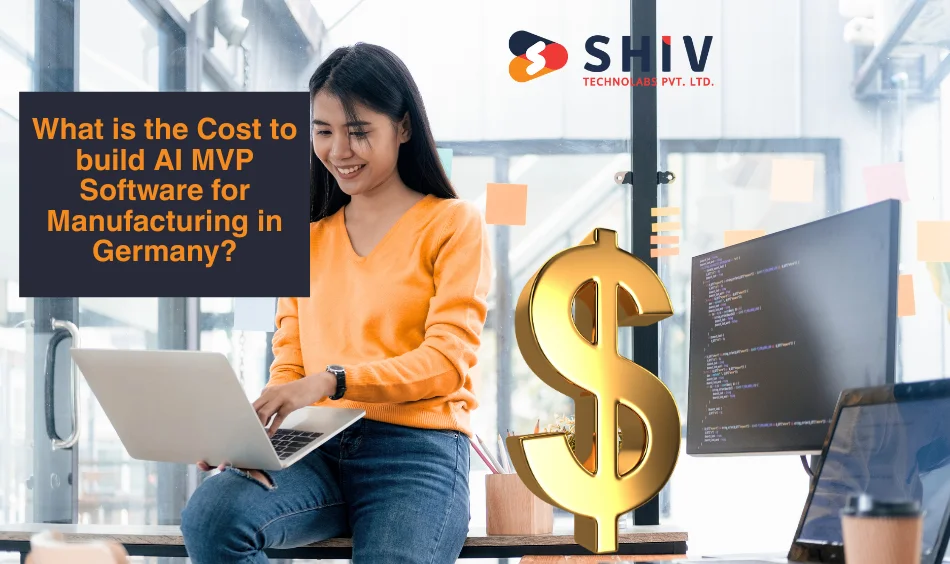
Founders often ask about the cost to build AI MVP software for manufacturing in Germany. Budgets vary by scope, compliance depth, and data readiness across plants. Most teams pick one of three pricing models that match risk and clarity.
A fixed-price model suits a well-defined feature set with stable data sources and clear milestones. An hourly model fits research-heavy work where signals, models, or integrations may change. A hybrid model blends a fixed discovery core with time-boxed sprints for rapid iterations.
Estimated Budget Guide
| Project Type | Estimated Cost (€) | Time Frame |
|---|---|---|
| Basic prototype | 25,000–40,000 | 1–2 months |
| Mid-level automation MVP | 50,000–80,000 | 3–4 months |
| Advanced AI-driven MVP | 90,000–150,000 | 5–6 months |
After shortlisting a path, teams often compare product templates and custom software development in Germany. Templates cut early setup, while custom builds fit unique machines, safety rules, and reporting needs. The right choice depends on data quality, plant variability, and the speed required for pilots.
Key cost drivers include model complexity, shop-floor integration, and certification demands across sectors. Data volume, labeling effort, and historical gaps can add effort during the training phase. Vendor access, PLC quirks, and MES or ERP constraints also shape timelines and team size.
Common cost factors to review
- Data quality, labeling time, and retraining needs
- Security audits, privacy rules, and buyer certifications
- Integration work across PLC, SCADA, MES, and ERP layers
- Uptime targets, failover plans, and incident response coverage
Clear discovery keeps spending tight, while pilot KPIs guide go-or-grow decisions. With the right scope, teams show savings quickly and secure larger rollouts without budget shocks.
How to Choose the Right MVP Software Development Partner for AI Projects?
Strong partners in MVP software development help your AI MVP software move from lab to line. Look for industrial depth, repeatable delivery, and credible support across pilots and early rollouts. Your partner should speak both data science and plant operations without long translation cycles.
Selection criteria
- Proven AI manufacturing expertise with references and live KPIs
- Portfolio of MVP launches that reached paid pilots
- Data-security compliance with auditable access controls
- Post-launch support covering incidents and retraining cycles
- Clear handover plans for your internal team
Freelancers can fit tight budgets but may struggle with multi-plant timelines and audits. MVP development services in Germany bring local compliance fluency and faster vendor coordination. In-house teams offer control, while partners speed pilots when headcount or skills are limited.
What Real-World Examples Show AI MVP Software Success in Germany’s Manufacturing?
Across Germany, leading manufacturers ship focused AI MVPs into live production. Brands convert factory data into practical wins before large rollouts.
Audi – AI for spot-weld quality at Neckarsulm
Audi applies AI to analyze roughly 1.5 million spot welds on 300 vehicles each shift. Teams moved from random ultrasound checks to targeted anomaly reviews, improving speed and inspection coverage on the line.
BMW – AI vision and digital twins for quality control
BMW uses automated image recognition in series production to spot deviations within milliseconds and reduce false rejects. The company also builds virtual factory twins to plan assembly with AI support before changes hit the floor.
Volkswagen – predictive maintenance through the Industrial Cloud
Volkswagen’s data platform pairs shop-floor signals with machine learning to predict failures and stabilize output. Recent updates extend the AWS collaboration to more sites, aiming for significant efficiency and cost savings.
How AI MVP Software Takes Startups From Prototype to Scale
AI-powered MVP software builds a testable core that fits plant workflows, then grows with production feedback. You connect clean data flows, tune models against noise, and add modules buyers request during pilot gates.
Scaling actions
- AI model tuning based on fresh sensor and line data
- Cloud rollout for secure access and faster updates
- Predictive maintenance loop tied to work orders and service windows
- Multi-site expansion with shared KPIs and playbooks
Our AI MVP software solutions help startups go from prototype to scale across Germany’s manufacturing ecosystem.
Conclusion
AI MVPs cut risk, speed learning, and turn live metrics into stronger sales stories. This approach aligns with Germany’s Industry 4.0 goals while keeping budgets clear and results measurable. If you want a confident start and faster pilot wins, partner with Shiv Technolabs, a trusted MVP development company in Germany for AI MVP builds and factory-ready integrations. Book a consultation or request a demo to review scope, data plans, and pilot KPIs.
FAQs
Q1. What is AI-powered MVP software in manufacturing?
It’s a minimum viable product that adds AI to automate validation, insights, and targeted actions on the floor.
Q2. How much does MVP software cost in Germany?
Budgets vary by scope, from basic prototypes to advanced builds. Complexity, certifications, and data readiness shape totals, as shown in our earlier table.
Q3. What are the top benefits for German startups?
Faster validation, lower rework, and better decisions from machine data, with clearer ROI during pilot reviews.
Q4. How do services in Germany support Industry 4.0?
Local teams know standards and vendors, integrate AI with PLC, SCADA, MES, and ERP layers, and guide audits without long delays.
Q5. Can AI MVP software support global scale?
Yes. Models travel with data pipelines and cloud delivery, keeping performance steady across new sites and regions.

